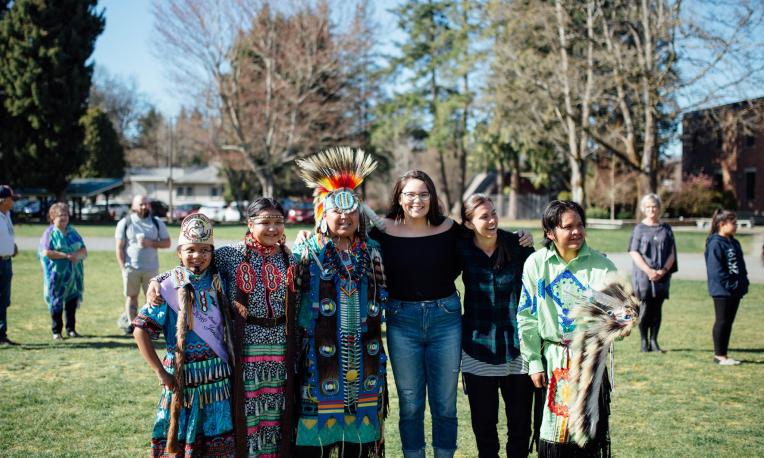
TWU researcher Nicole Kruger explores how Canadian emerging adults perceive reconciliation, and seeks to understand what it is like for the future generation of Canada to be asked to take action for the past. Her work responds to the calls for action from the Truth and Reconciliation Commission in Canada (TRC) and is part of the ongoing conversation about reconciliation between non-Indigenous and Indigenous peoples of Canada.
Kruger is a TWU Master of Arts in Counselling Psychology student and winner of a $17,5000 award from the Social Sciences and Humanities Research Council of Canada. Since November 2019, she has been investigating the level of motivation of emerging adults to participate in Indigenous reconciliation. Patti Victor, TWU's University Siya:m; Dr. Janelle Kwee, Program Director of the M.A. in Counselling Psychology; and Dr. Marvin Macdonald, M.A. Counselling Psychology professor, are committee members on Kruger's research project.
In 2018, there were 7 million emerging adults aged 15 to 29 living in Canada. Together they represented 19.2% of the country’s population.
Path towards meaningful engagement in reconciliation
Kruger believes that reconciliation will not occur until Canadians understand the underlying process of reconciliation for non-Indigenous emerging adults. Her research asserts that psychological maturation and ego development are paramount to an individual's meaningful engagement in reconciliation.
“Reconciliation must take place at the individual, community, institution, and societal level,” Kruger explains. “However, many Canadians do not know what reconciliation between Indigenous and non-Indigenous peoples means to them.”
Kruger’s research seeks to uncover how emerging adult non-Indigenous students envision engaging in reconciliation with Indigenous peoples in Canada today.
Through interviews and analysis using a grounded theory approach, Kruger is listening for what people think about when they think of reconciliation. She investigates the underlying processes of how people come to their conclusions, and seeks to untangle biases.
Canadians’ range of reconciliation responses
Kruger observes that Canadians’ views on reconciliation are complex. “What’s emerged from the research is that people in Canada think about reconciliation in very different ways,” she says.
Among non-Indigenous Canadians, Kruger reports that these differences in attitude range from the feeling that reconciliation is a governmental responsibility (versus a personal one), to feeling that reconciliation may threaten one’s own livelihood. In her research, Kruger also observed instances of ethnocentrism, or a preference for the needs of one’s own ethnicity.
Canada is a mosaic of approximately 250 ethnic origins or ancestries. The variation in cultural attitudes makes it difficult for Canadian society to respond collectively to the call for reconciliation, Kruger observes.
Responding can be particularly complicated for peoples who were not born in or did not grow up in Canada. Immigrants and ethnic minorities may find safety in non-participation or in being observers to the process of reconciliation, Kruger explains.
“We struggle with what reconciliation gives to us and takes from us,” Kruger says. She observes that some people fear how reconciliation may threaten own cultural identity. Although it is common for people to struggle with reconciliation, her research looks into the processes of how those struggles developed.
Responding to Canada’s Truth and Reconciliation Commission
Kruger’s research project responds to the calls for action from the Truth and Reconciliation Commission in Canada (TRC).
“This project is a timely response to the invitation from the TRC of Canada to participate in reconciliation, because this research explores ways that psychological maturation and ego development may shape an individual’s meaningful engagement in reconciliation,” Kruger says.
The TRC suggests that reconciliation depends on an "awareness of the past, acknowledgement of the harm inflicted, atonement for the causes, and action to change behaviour”.
Developing combined ways of seeing the world
Action to change behaviour could include an approach described as “two eyed seeing” or “etuaptmumk,” a concept introduced to Kruger by Dr. Marvin Macdonald, TWU M.A. Counselling Psychology professor.
Kruger explains this approach as learning to see from one eye with the strengths of Indigenous knowledge and ways of knowing, and seeing from the other eye with the strengths of western knowledge and ways of knowing.
This combined way of seeing the world is believed to bring greater benefit to all.
Yet, developing new ways of seeing could be one of the most challenging elements of societal reconciliation, Kruger says, because it requires a conceptual shift from thinking of “them and us” to “us and us”.
Moreover, learning to see from the perspectives of others requires adolescents and emerging adults to develop skill and ability to reflect upon the more significant implications of a particular event such as reconciliation.
In contrast to “two eyed seeing,” Kruger also observes structures of feeling that can be compared to one eyed thinking or prisons of thought.
Freedom from prisons of thought may require the questioning of longstanding institutionalized frameworks. “We can query ourselves about the future of Canada and what the future looks like without neo-colonialism,” says Kruger. “Beginning this conversation may be the key to unlocking the door of the settler’s cognitive prison.”
Although Kruger’s study will clarify the threats and limitations of various attitudes between Indigenous peoples and emerging non–Indigenous adult students, Kruger states that reconciliation is beyond the scope of this project.
“This study is an investigation of a colonial society as it shapes the subjective experience of non-Indigenous emerging adults in Canada today,” she says. “It highlights the potential barriers that can prevent the voluntary participation of emerging adults from joining in a dialogue about reconciliation with Indigenous peoples of Canada.”
Kruger’s project aims to become an integral part of the ongoing conversation about reconciliation between non-Indigenous and Indigenous peoples of Canada.
About Trinity Western University
Founded in 1962, Trinity Western University is Canada’s premier Christian liberal arts university dedicated to equipping students to find and fulfill their purpose in life. It is a fully accredited research institution offering liberal arts and sciences, as well as professional schools in business, nursing, education, human kinetics, graduate studies, and arts, media, and culture. It has five campuses: Langley, Richmond-Lansdowne, Richmond-Minoru, Ottawa, and Bellingham, WA. TWU emphasizes academic excellence, research, and student engagement in a vibrant faith community devoted to supporting vibrant leaders seeking to have a transformational impact on culture. Learn more at www.twu.ca or follow us on Twitter @TrinityWestern, on Facebook and LinkedIn.
For media inquiries, please contact: media@twu.ca

